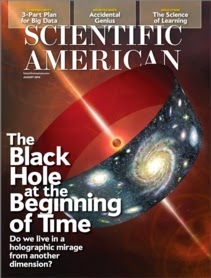Celebrating my 52nd birthday. Resuming Sunday.
All Posts (6515)
A novel way of measuring a photon’s location allows physicists to measure its momentum, too — a feat once thought impossible.
Quantum mechanics imposes a limit on what we can know about subatomic particles. If physicists measure a particle’s position, they cannot also measure its momentum, so the theory goes. But a new experiment has managed to circumvent this rule—the so-called uncertainty principle—by ascertaining just a little bit about a particle’s position, thus retaining the ability to measure its momentum, too.
The uncertainty principle, formulated by Werner Heisenberg in 1927, is a consequence of the fuzziness of the universe at microscopic scales. Quantum mechanics revealed that particles are not just tiny marbles that act like ordinary objects we can see and touch. Instead of being in a particular place at a particular time, particles actually exist in a haze of probability. Their chances of being in any given state are described by an equation called the quantum wavefunction. Any measurement of a particle “collapses” its wavefunction, in effect forcing it to choose a value for the measured characteristic and eliminating the possibility of knowing anything about its related properties.
A very GOOD video explanation of Quantum Mechanics at the link, an episode of "Instant Egghead." I promise your hat will still fit after viewing it.
Scientific American:
Particle Measurement Sidesteps the Uncertainty Principle, Clara Moskowitz
 |
| Source: Technology Review |
TECHNOLOGY REVIEW: One of the more significant practical challenges currently occupying molecular biologists is to find better ways of identifying short strands of DNA. Called oligonucleotides, these strands of nucleotides are hugely useful in processes such as genetic testing, forensics and DNA amplification.
But identifying the strands is a somewhat laboured business. Almost every detection method relies on fluorescent dyes and markers that can be picked up by optical sensors providing a useful but indirect indication of the molecules that are present.
But molecular biologists would like a better system that measures the characteristics of the molecules involved and so provides direct evidence of the sequence of nucleotides. Indeed, various research teams are working on such systems, some with significant success.
Today, Andrey Chernev at St Petersburg Academic University in Russia and a few pals say they have invented an entirely new way of identifying oligonucleotides using terahertz radiation. “Our results demonstrate a new method for label-free, real-time oligonucleotide characterisation,” they say.
An oligonucleotide is a short single-stranded DNA or RNA molecule usually consisting of fewer than a hundred or so bases. The sequence of these bases determines the type of oligonucleotide. So the ideal detection mechanism would reveal this sequence.
Abstract
Our results demonstrate a new method for label-free, real-time oligonucleotide characterisation by their self-resonant modes, which are unique to their conformation and sequence. We anticipate that our assay will be used as a starting point for a more detailed investigation of the aforementioned mechanism, which can be used as a basis for oligonucleotide detection and analysis. Furthermore, this technique can be applied to improve existing modern genetics technologies.
Physics arXiv: DNA Detection By THz Pumping
Andrey L. Chernev, Nicolay T. Bagraev, Leonid E. Klyachkin, Anton K. Emelyanov, Michael V. Dubina
Here's a peak at one of the images from Aura- The art of Winston Blakely.
This particular concept will be a one shot book and the heroine will be featured
in an upcoming anthology that has been planned a while ago and now in the
works.
The first effective technique for growing a batch of single-walled carbon nanotubes (SWCNTs) that all have the same molecular structure has been developed by scientists in Switzerland. The new process involves using "seed molecules" on a platinum substrate to grow SWCNTs with the desired structure. The breakthrough could be extremely important to those developing electronic devices based on SWCNTs because nanotubes with different structures can have very different electronic properties.
An SWCNT can be thought of as an atomically thin sheet of carbon that has been rolled up to form a tube about 1 nm thick, resembling a drinking straw. The carbon sheet always has the same honeycomb structure, which it shares with graphene. However, there are about a hundred different ways that the edges of the sheet can join together to make a tube, and this defines whether an SWCNT conducts electricity like a metal or a semiconductor. In the case of semiconducting nanotubes, the size of the electronic band gap also depends on how the edges are joined.
Electronic devices based on SWCNTs could, in principle, be used to create transistors and other components that are smaller, faster and more energy efficient than those based on silicon. But before that can happen, scientists have to come up with reliable ways of producing batches of SWCNTs with identical structures.
Physics World: Molecular seeds sprout identical carbon nanotubes
 |
| Perhaps we should re-evaluate who was really "stupid"; the birds or the people who allowed the complete extinction of the birds to take place. Word Info |
By Simon Powers, University of Lausanne
For hundreds of thousands of years humans lived in hunter-gatherer societies, eating wild plants and animals. Inequality in these groups is thought to have been very low, with evidence suggesting food and other resources were shared equally between all individuals. In fact, in the hunter-gatherer societies that still exist today we see that all individuals have a say in group decision making. Although some individuals may act as leaders in the sense of guiding discussions, they cannot force others to follow them.
But it seems that with the beginning of agriculture around 10,000 years ago, this changed. An elite class began to monopolise resources and were able to command the labour of others to do things, such as build monuments in their honour. So how was it that egalitarian societies, where all men were equal, transitioned into hierarchical societies where despots reigned? See: Raw Story
Once upon a time: hunter-gatherers in small bands had no leaders. We all ate a paleo-diet because that's all that there was - fast food chains hadn't been invented yet. We lived short lives, our vocabularies were limited, but we were ripped to shreds for our brief time in the sun. It was like a John Lennon song.
Then, along with agriculture, cities, finance, commerce, bread and reading, we birthed assholes. The bread made us fat and sedimentary, and since the saber tooth tigers died out - well before the Dodos - we had no natural predators that flexed our muscles or our minds. Couple that with remote controls, home computers, the Internet and flat screens with propaganda-as-news and [non] reality-TV and we were really screwed. The anus-class justified their existence by entrepreneurial genius; "divine right" ('cause, no one can argue with that), and suppression of anyone's rights other than their own. Most of them - like modern psychopaths - rose to prominence in positions of high authority, because they "sounded" like they knew what they were talking about even if they didn't. Keeping us divided through racism, sexism, xenophobia, etc. were and are tactics similar to the cynical observations of LBJ.
Nowadays, the royal anuses finance obfuscation on climate change (as their class previously did on the dangers of leaded gasoline and smoking); bribe politicians obviously addicted to crack cocaine, and buying elections. Speaking of lead, solving it may have remedied a myriad host of issues had the lying not taken place. But again, they excel at convincing everyone they have the answer to everything in simple soundbite philosophies spouted by their uneducated parrots in owned media to their under-educated minions, making John Steinbeck more prophet than author. A salient, poignant sign at the start of the Occupy Wall Street movement stated: "Satan runs Wall Street! One day, the poor will have nothing left to eat BUT the rich!" Never an advocate of cannibalism, but I observe in this case, they will at least be recycled into a usable compost contributing to new hunter-gatherer crops.
Despite Malcolm X's farm metaphor, it is the Dodos that have come home to roost. The birds were slaughtered for meat by the stupid humans that allowed them to perish. We obviously can't solve the problems in the Near East nor problems at our own borders, healthcare or funding the government at home, the Venn diagram intersection being their genesis from US policies that can be summed as "kicking the can down the road" and "whistling in the wind" without the calculation of blow back. Now, "eating our own" - usually, a political metaphor - is applied to the human species, and WHO will pen the image of our remains (at, if it comes to that, our demise)?
 |
| Dr. Z - MySciNet |
I had the pleasure of meeting Dr. Z at the joint NSBP/NSHP conference in Austin, Texas. Also met Dr. Hakeem Oluseyi, who you see Saturdays on "Outrageous Acts of Science."
From MySciNet: Aziza Baccouche—Dr. Z, as she calls herself—has made a career connecting scientific research to the people it could affect, such as informing patients about medical developments and getting more minority students interested in science. Her medium is the screen, and she tells the stories of science through documentaries. But Baccouche, a Ph.D. physicist-turned-filmmaker, will likely never clearly see any of her finished products: She became legally blind at the age of 8, and ever since she's relied on her wits, passion for science, excellent memory, and what she calls her vision to achieve success.
"We know power is work over time, that strength is endurance over time. So I endured a lot of obstacles, but at the same time I created strength and vision and wisdom and endurance."
You may/may not get the following "warning":
As the meme says, "remain calm" and open her Ted Talk in You Tube. I assure you it's inspiring and worth it.
Tomorrow: Chaos Theory
Independent (aka small-press) publishers and author-publishers tend to do a lot of marketing with as little $$ as possible. Sites like BSFS provide members with the opportunity to promote their work on this site. So, is there a marketing tool that all of the above could benefit from with minimal $$ outlay?
You betcha.
Foreword Reviews reviews books published by "indie" publishers (there seems to be some disagreement on exactly what "indie" means; for my purposes here, it means any means of publication <b>not</b> including any "major " print publishing house and/or "traditional" publisher regardless of publishing mode [includes ebooks]). The print magazine began publishing 15 years ago with librarians and independent booksellers as their target readership. They've since expanded into a strong online presence, and recently have expanded their target audience to include the general public. The print mag's design was recently renovated, and the website was redesigned within the last two months.
Does your publisher know about Foreword Reviews? This would be a good time to ask. This would also be a good time to check out the FWR site for yourself.
"Why do you go on so about this magazine/website?" you might ask.
I do so because: FWR is a great resource for readers, writers and publishers; getting libraries to purchase one's book can mean better income for writers (depending on contract clauses) as (afaik) library editions cost more since they're made to take repeated use; and for a very selfish reason. I'm a freelance reviewer (fiction and non) for FWR, it's a good-paying gig, and I've had the opportunity to read some excellent books in doing so. Email me for the link to my FWR reviews if you're interested.
I just wanna read more great books, tbh. :-)
 |
| Source: Fold Ed Fun |
With its own soundtrack no less...
And yes, I got nostalgic as life imitates comic art (intro)...
Science Mag: Robot folds itself - and walks away, Jia You
 |
| Source: Link below |
In his Allegory of the Cave, the Greek philosopher Plato described prisoners who have spent their entire lives chained to the wall of a dark cavern. Behind the prisoners lies a flame, and between the flame and prisoners parade objects that cast shadows onto a wall in the prisoners' field of view. These two-dimensional shadows are the only things that the prisoners have ever seen—their only reality. Their shackles have prevented them from perceiving the true world, a realm with one additional dimension to the world that they know, a dimension rich with complexity and—unbeknownst to the prisoners—capable of explaining all that they see. [1]
It could be time to bid the Big Bang bye-bye. Cosmologists have speculated that the Universe formed from the debris ejected when a four-dimensional star collapsed into a black hole — a scenario that would help to explain why the cosmos seems to be so uniform in all directions.
The standard Big Bang model tells us that the Universe exploded out of an infinitely dense point, or singularity. But nobody knows what would have triggered this outburst: the known laws of physics cannot tell us what happened at that moment.
In our Universe, a black hole is bounded by a spherical surface called an event horizon. Whereas in ordinary three-dimensional space it takes a two-dimensional object (a surface) to create a boundary inside a black hole, in the bulk universe the event horizon of a 4D black hole would be a 3D object — a shape called a hypersphere. When Afshordi’s team modelled the death of a 4D star, they found that the ejected material would form a 3D brane surrounding that 3D event horizon, and slowly expand.
The authors postulate that the 3D Universe we live in might be just such a brane — and that we detect the brane’s growth as cosmic expansion. “Astronomers measured that expansion and extrapolated back that the Universe must have begun with a Big Bang — but that is just a mirage,” says Afshordi. [2]
1. Scientific American: The Black Hole That Birthed the Big Bang
2. Nature: Did a hyper-black hole spawn the Universe?
Florida July 2014 Black Bed Sheet Publishing announces the release of the streetlit horror story It Happened on Negro Mountain by Jeff Carroll. It Happened on Negro Mountain is a real place located in Maryland. It Happened on Negro Mountain is available everywhere books are sold.
Negro Mountain is located in west Maryland, on the West Virginia boarder, which divided the Colonial North and South most popularly known as the Mason Dixon Line. The Mountain was named “Negro” because of a heroic Africa Slave who single handedly fought off the Confederate Army soldiers and Native Americans. Now, Negro Mountain is said to be protected by the spirit of the African. The saying is Negro Mountain is a place where bad things happen to bad people. So, when negative energy meets with the energy resting in Negro Mountain the outcome is always the same, The Mountain wins.
“After having success with my first horror story Thug Angel Rebirth of a Gargoyle I wanted to craft another story where I could send chills down the spins of the hardest street thug. No one has ever met a vampire and werewolf but Negro Mountain is real, you can visit it and that makes it ever more scary,” said Jeff Carroll of his work.
It Happened on Negro Mountain (Black Bed Sheet Publishing Paperback, July 25, 2014, ISBN: 978-0692255650-7$16.00 and $3.99 ebook) set to change the face of Streetlit and Horror with author Jeff Carroll. Jeff Carroll a lover of good old fashion horror stories with a creepy origins and not lots of special effects. He found Negro Mountain while road managing a trip to West Virginia. After seeing the highway sign for Negro Mountain he and his partner quickly jumped out of their cars and took picture. Jeff came home a google Negro Mountain and the rest is history.
It Happened on Negro Mountain is a story about a Drug Dealer who has been forced out of his empire. Rather than just submitting he decides to destroy his empire instead of agreeing to the demands of the younger drug dealers whom he started off. His plans to leave his neighborhood turf with his babymother and seven year old daughter for a year. This will allow chaos to erupt and let the young dealers kill each other before he returns to reclaim his post. The place he chooses to hide out is NEGRO MOUNTAIN.
Jeff Carroll lives in South Florida, with his wife and son. He is a writer, a filmmaker and owner of Hip Hop Comix N Flix. He enjoys writing Sci/fi, Horror and fantasy stories with lots of action and a social edge. He has written and produced 2 films, his second film was Gold Digger Killer won 3 film awards including BEST Picture at the International Hip Hop film festival. Jeff Carroll is the author of the non-fiction book The Hip Hop Dating Guide. When he is not writing horror stories he enjoys speaking on Healthy Dating to college and high school students everywhere and goes by Yo Jeff.
http://www.amazon.com/Happened-Negro-Mountain-Jeff-Carroll-ebook/dp/B00LWXBDRI
 |
| Image Source: Women in Planetary Science |
Dr. Alexander is the Project Scientist for the U.S. portion of the international Rosetta mission. She has also been the Cassini Project Staff Scientist and as the final project manager of the Galileo mission, overseeing its fiery crash into Jupiter. Her scientific interests include gaskinetic theory, theory of gaseous escape from planetary and cometary regoliths, theory of surface bound exospheres, magnetospheric plasma theory (terrestrial and planetary), exobiology, interdiciplinary science, and oxidation / reduction potential of planetary and cometary regoliths. Source: see #P4TC links below.
Space.com: Rosetta Probe Arrives at Comet
#P4TC links:
Rosetta...
Rosetta's Stone...
| Mom's book of "me" |
Education
What does research reveal about how people learn and which educational methods and policies are most effective? An evidence-based approach can provide valuable input into often-controversial debates about educational methods and policy. Our reports have examined and synthesized the evidence on a broad range of questions, from how to accurately measure high-school dropout rates, to the effects of incentives on student learning, to how adults learn to read. Given our affiliation with the National Academy of Sciences and National Academy of Engineering, one area of emphasis is studying how children most effectively learn about science, technology, engineering, and mathematics. [1]
OK, that's the official tag line. Coming up with the "most effective" method, as if the previous methods were moribund or ineffective. We got to the moon with slide rules, trig and memorized time tables; not on-board computers, laptops or calculators. Also from personal experience, it helps when your parents think it's important that you learn the material, and help or get help for you when you have struggles. It also helps that adults have an appreciation for lifelong learning and respect the preparation and training STEM fields requires, and how to integrate that into the administration of a democratic republic.
The title of this post is obviously Japanese, and it literally translates to "lesson study," a set of practices that Japanese teachers use to hone their craft. [2] This is not a "bash American Education" post, nor does it attempt to elevate Japanese pedagogy. We can however, learn from other successful models (Finland comes to mind).
The National Academy of Sciences speaks on this concern (see "official tag line" paragraph). One of the links at the article "Climate Change Education Roundtable" (this is the actual link) has by its title, an uphill battle with a well-heeled fossil fuels industry that finances obfuscation to keep the status quo (and, thus the money flow upward *). The tobacco industry exemplī grātiā.
I would just like to do something different than our current flirtation with pseudoscience for political expediency. A false science produces false results. Faux results - assertions not based in reality - are typically in the long run for the wealth of nation states neither sustainable nor profitable.
1. National Academy of Sciences: Topics>Education
2. New York Times: Why Do Americans Stink at Math?
* Yet man is born to trouble as surely as sparks fly upward. Job 5:7
Does anybody really know what time it is? Does anybody really care?
Ok all you knowledge knowers here is the enigma in my mind. What time is it? In the reasoning of the astro- enthusiast, that's astronomers and astrologers and history pattern recogs, we are near the Age of Aquarius. Hold your anti-hype weapons we are talking constellational time. Reports are scattered, some say we be in it and some say it is still coming.
A Great year, it has been said, is 25920 years. The sun and our solar systems does the sidereal progression (backwards) thru the 12 somewhat fixed constellations. That's 25920 years divided by 12 to equal 2160 years in each constellation or sign. Some people looked long and hard to write this pattern down.
Against this calc is the Roman Empire's Gregorian calendar calcs which overwrote the Egyptian calc we all know and love, several times.
Some arguments said they couldn't decide which fixed star in any fixed constellation was used to base calculations on. I'd say Sirius but who am I? Was reading a Hermetic book "The Light of Egypt", vol 2. It mentioned many in the occult realm considered 1881 as the pivotal year for crossing into the Aquarian age.
Many rock-n-roll songs say different, so what happened in 1881 to make it so outstanding? Before 1881 believers of all sorts, especially religious ones. After 1881 reason and science exploded and Thomas Edison and Tesla. Aquarius is air, reason, invention and ruled by Uranus governs the occult, electricity, aviation, science.
Is there an out of sync public knowledge and an in-sync hidden knowledge? Or are we all screwed up?
There is a biblical angle too.
It is said that Christianity is characteristic of the Piscean Age. Jesus told the disciples to find a man with a water jug to prepare for that last supper. Aquarius the symbol is a man and water jug. Using the formula 1 day is as a thousand years, Jesus was buried and rose in 3 days (tradition). The biblical account is actually 2 to 2-1/2 days. 3 days would be 3000 years counting from his death. 2 days to 2-1/2 days is 2000 to 2500 years.
If an "Age" is 1/12th of a great year (25920) or 2160 years and the age started with Jesus (assuming), that is 0ad (ad = year of domination) and it's 2014ad now, we got 146 years till kingdom come, a new world order, the Aquarian age and or god comes back. Oh wait, he did say he'd be with us till the end of the age. What he mean by that? Does anybody really know what time it is? Does anybody really care? and who is the lady with the broken diamond watch? I can't believe we fell for that one.
I am really thinking the most important thing Africans (Egyptians) did was track time, clocks, calendars, celestial rhythms. They put us in sync with the all.
Now we got computers and cranes, can't build pyramids, can't tell time! huh! or is it that some know the time and it is hidden from the rest of us?
 |
| Source: Technology Review |
If you find yourself with an old 30 meter satellite communication antenna, what should you do with it? One option is to convert it into a radio telescope, which is exactly what astronomers at the Auckland University of Technology in New Zealand have done with an old dish lying around in the northernmost reaches of the country.
So what exactly do you have to do to convert a communications antenna into a radio telescope? Today, Lewis Woodburn at the Auckland University of Technology and a few pals, answer this question by detailing the process they have gone through to make the conversion.
The old satellite communications dish in question was built in 1984 for the New Zealand Post Office and transferred to Telecom New Zealand in 1987. By 2010, the dish had become obsolete and the company stopped maintenance with the intention of demolishing it. That’s when the Auckland University of Technology stepped in.
Abstract:
We describe our approach to the conversion of a former 100-foot (30-m) telecommunication antenna in New Zealand into a radio telescope. We provide the specifications of the Earth Station and identify the priorities for the conversion. We describe implementation of this plan with regards to mechanical and electrical components, as well as design of the telescope control system, telescope networking for VLBI, and telescope maintenance. Plans for RF, front-end and back-end developments based on radio astronomical priorities are outlined.
Physics arXiv:
Conversion of New Zealand's 30m Telecommunication Antenna into a Radio Telescope
Lewis Woodburn, Tim Natusch, Stuart Weston, Peter Thomasson, Mark Godwin, Sergei Gulyaev
NASA: New "impossible" engine works, could change space travel forever
Shawyer's engine is extremely light and simple. It provides a thrust by "bouncing microwaves around in a closed container." The microwaves are generated using electricity that can be provided by solar energy. No propellant is necessary, which means that this thrusters can work forever unless a hardware failure occurs. If real, this would be a major breakthrough in space propulsion technology.
Obviously, the entire thing sounded preposterous to everyone. In theory, this thing shouldn't work at all. So people laughed and laughed and ignored him. Everyone except a team of Chinese scientists. They built one in 2009 and it worked: They claimed they were able to produce 720 millinewton, which is reportedly enough to build a satellite thruster. And still, nobody else believed it.
Now, American scientist Guido Fetta and a team at NASA Eagleworks—the advanced propulsion skunkworks led by Dr Harold "Sonny" White at the Johnson Space Center—have published a new paper that demonstrates that a similar engine working on the same principles does indeed produce thrust. Their model, however, produces much less thrust—just 30 to 50 micronewtons. But it works, which is amazing on its own. They haven't explained why their engine works, but it does work:
Test results indicate that the RF resonant cavity thruster design, which is unique as an electric propulsion device, is producing a force that is not attributable to any classical electromagnetic phenomenon and therefore is potentially demonstrating an interaction with the quantum vacuum virtual plasma.
The entire idea that we have found something that seems to go against the the principle of conservation of momentum just seems crazy to me. But the fact that it has worked for two independent parties can't be denied. That's the laboratory speaking. Then again, perhaps both labs made a mistake. I'm sure this will be tested by the Russians and the Europeans too, but at least I'm glad we are working on it.
But the fact that we may be witnessing something completely new, something that may push us forward into sci-fi territory once again, is very exciting.
http://sploid.gizmodo.com/nasa-reveals-new-impossible-engine-can-change-space-t-1614549987/
Jesus Diaz
http://yul.kinja.com/absorption-apocalypse-rises-this-movie-tells-a-story-1615137086
"One of the penalties for refusing to participate in politics is that you end up being governed by your inferiors." Plato
Political science is the study of governments, public policies and political processes, systems, and political behavior. Political science subfields include political theory, political philosophy, political ideology, political economy, policy studies and analysis, comparative politics, international relations, and a host of related fields. (For a good cross section of the areas of study, see the list of APSA Organized Sections.) Political scientists use both humanistic and scientific perspectives and tools and a variety of methodological approaches to examine the process, systems, and political dynamics of all countries and regions of the world. American Political Science Association, What is Political Science?
Nihilism (n):
1 a : a viewpoint that traditional values and beliefs are unfounded and that existence is senseless and useless; b : a doctrine that denies any objective ground of truth and especially of moral truths
2 a : a doctrine or belief that conditions in the social organization are so bad as to make destruction desirable for its own sake independent of any constructive program or possibility; b capitalized : the program of a 19th century Russian party advocating revolutionary reform and using terrorism and assassination Webster
Narcissism (n):
1 : egoism, egocentrism
2 : love of or sexual desire for one's own body
— nar·cis·sist noun or adjective
— nar·cis·sis·tic adjective
Examples of NARCISSISM
Origin of NARCISSISM
German Narzissismus, from Narziss Narcissus, from Latin Narcissus
First Known Use: 1822, also Webster and Narcissistic Personality Disorder
Lastly, Egoism
1 a : a doctrine that individual self-interest is the actual motive of all conscious action, b : a doctrine that individual self-interest is the valid end of all actions; 2 : excessive concern for oneself with or without exaggerated feelings of self-importance — compare egotism 2 Ibid
C-Span feeds it; 24-hour news cycles and "gothca" soundbite politics cultivates it; well-heeled dark money encourages it. The "science" has been removed from the definition and "cult" would be more appropriate.
We should not be surprised one iota that a cult sect that says they're for "limited government" would wish it diminished: "small enough to drown it in the bathtub" to paraphrase Grover Norquist. The apotheosis of "The Gipper" has resulted in a "Facebook for patriots." Despite his deification, The Gipper didn't attend church on a regular basis. Despite his tax-cutting legend, he wasn't above negotiations that meant raising taxes. Even David Stockman - no pinko commie - has pretty much disavowed "trickle-down economics." Today, there is a love of the products of science by the cult and a disdain for its report on Climate Change. Corporate news that has the legal right to lie to the electorate; still lying to itself after its "predictions of the Romney landslide" fell to dried fecal dust. Facts are the bereft antithesis to dogma when your sect disdains the "reality-based community."
550,000 children were sacrificed on Moloch altars; "crematoriums of care" (or, don't care). Their dreams have become nightmares as this political stunt is similar to lemmings in suicide vests for any leverage in the nation's changing demographics. A paired-down "bill" that demands deportation back to the humanitarian crisis meat grinder some of these recent kids escaped; a result of our trade polices, a moribund, oxymoron "war on drugs" and an appetite for the same sorcery. There is 1 death every 74 minutes in Honduras. So much for the "war." Suing the president for using executive powers expanded under his predecessor; then demanding he use the same to "solve the crisis at the border." It would be an SNL skit or an "Onion" faux story, but it sadly, is a part of our congress that is clearly psychotic.
I don't use the word "cult" lightly. Mike Lofgren - previous life as a GOP operative - takes his former party to task in his op-ed: "Goodbye to All That: Reflections of a GOP Operative Who Left the Cult."
Two poignant excerpts:
"It should have been evident to clear-eyed observers that the Republican Party is becoming less and less like a traditional political party in a representative democracy and becoming more like an apocalyptic cult, or one of the intensely ideological authoritarian parties of 20th century Europe. This trend has several implications, none of them pleasant.
"Far from being a rarity, virtually every bill, every nominee for Senate confirmation and every routine procedural motion is now subject to a Republican filibuster. Under the circumstances, it is no wonder that Washington is gridlocked: legislating has now become war minus the shooting, something one could have observed 80 years ago in the Reichstag of the Weimar Republic. As Hannah Arendt observed, a disciplined minority of totalitarians can use the instruments of democratic government to undermine democracy itself."
We are being held hostage by nihilistic narcissists/domestic terrorists: more intent on wrecking "collectivism"-cum-Koch rebuke, deliberately sabotaging the very idea of democratic republics, holding off scrutiny from many well-meaning peoples with a few biblical verses and babble on the "sanctity of the unborn." We can't solve the crisis at the border; the crisis in the Near East; Ebola virus containment; Climate Change; education reform minus standardized testing idiocy; global competitiveness in science and technology; jobs; keeping the government open: we can't pass laws in a governing body where part of it doesn't believe in government. When the Earth and entire universe is only 6,000 years old and "the end is nigh," there is no reason - as it, and logic have left the House of Representatives - and there is no possibility of solving complex problems. That is a ship of state teetering the narrow edge of self-extinction. It is arrogant to think the global powers would not change the world currency of commerce from the Dollar to the Yuan or Euro overnight.
Meanwhile, the now-born on the border fleeing violence are destined to be stillborn on their fleeing feet; as an esteemed member of congress and Civil Rights icon John Lewis has stated, "history will judge us harshly." More also for not demanding the one litmus test prior to running for public office that should matter for our leaders: a psychological evaluation on the fitness to serve.





